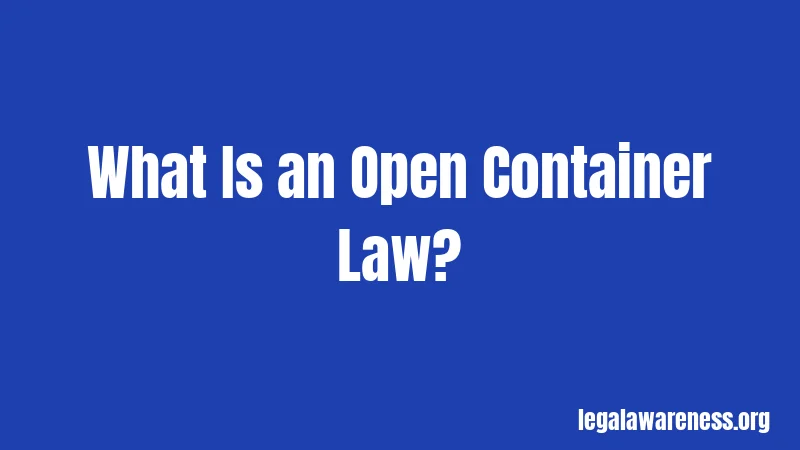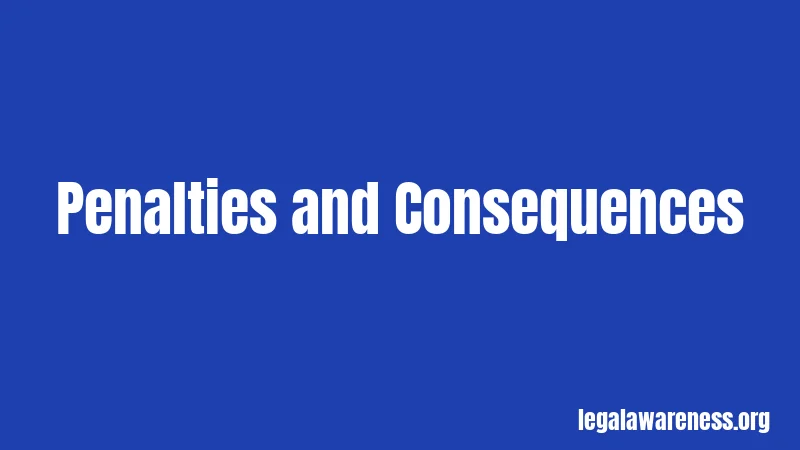Florida Open Container Laws (2026): A Clear Breakdown of What You Can’t Do
Most people think open container laws are just about drinking in your car. Not quite. In Florida, these rules are way more strict than people realize, and the penalties can seriously affect your life. Let’s break down exactly what you need to know.
You’re gonna love how straightforward this actually is. Once you understand the law, it becomes pretty obvious why it exists. Florida takes alcohol safety seriously, and open container violations can lead to fines, jail time, and a criminal record. Here’s what that means for you.
What Is an Open Container Law?

An open container law is basically a rule about where you can have open alcohol. Think of it like a rule against eating in certain areas of a library. It’s not that alcohol is banned everywhere, but it is banned in specific places.
In Florida, an open container is any bottle, can, or cup with alcohol that’s been opened, unsealed, or has some missing. Pretty straightforward. The law doesn’t care if you’re drinking or just carrying it around. The container just needs to be open.
Basic Open Container Laws in Florida
What the Law Actually Says
Florida Statute 316.193 is the main law you need to know about. Here’s the important part: you cannot have an open container of alcohol in a vehicle. That’s it. Sounds simple? It actually is.
But wait, it gets more serious. The law covers way more than just drunk driving. You could have an open beer in your passenger seat. You could have an open bottle in your trunk, but the seal needs to be intact. Open means open, and that’s what matters.
This rule applies to drivers and passengers. Seriously. Your friend in the backseat can get you both in trouble if they have an open drink. Not sure what counts as open? If the seal is broken, the cap is off, or some is missing, it’s open.
Where the Law Applies
Hold on, this part is important. The open container law applies specifically to motor vehicles on public roads. If you’re on private property with permission, the rules don’t apply the same way. That beach bonfire? That’s different. That parking lot party? Still technically illegal, but it’s not under the open container statute.
Confused about vehicles? Let me break it down. Cars, trucks, motorcycles, RVs, and vans all count. Basically any motor vehicle that can be driven on a public road falls under this law. Boats have different rules, which we’ll get to in a minute.
Penalties and Consequences

Here’s where it gets real. A first-time open container violation in Florida is a non-criminal traffic infraction. That means no jail time for the first offense, but you will get fined and points on your record.
The fine for a first offense is usually between $61 and $500. Not huge, but not nothing either. More importantly, you’ll get three points added to your driver’s license. Those points stick around and can affect your insurance rates.
Now, if you’ve had prior violations, things change. A second violation within five years becomes more serious. You could face a fine up to $500 and community service. The penalties keep increasing with each violation.
Think of it like a traffic ticket, but with more consequences. It’s less severe than a DUI, but still no joke. A criminal record from repeated violations can affect job applications, housing, and more.
Special Circumstances: Boats and Other Vehicles
Okay, pause. Read this carefully. Boats have completely different rules. On a boat, you can have open containers of alcohol. That’s the one place where open containers are totally legal in Florida.
But here’s the catch. The open container rules still apply if your boat is docked in a marina or moored in certain waters. You have to follow local ordinances. And obviously, the driver of a boat can’t be drunk, just like a car driver.
RVs are tricky. If the RV is parked and you’re not driving, it’s basically like a home. You can have open containers inside. But the second you put it in gear, it becomes a vehicle, and the law applies.
What about rideshare cars? Passengers in Ubers or Lyfts cannot have open containers. The driver obviously can’t either. That sealed bottle in your bag? That’s fine. An open drink in your hand? That’s not.
Recent Changes and Updates

Honestly, the main open container law in Florida hasn’t changed dramatically in recent years. Florida Statute 316.193 has stayed relatively consistent. However, local municipalities sometimes add their own rules.
Some cities in Florida have created stricter open container laws. For example, certain areas have “open container zones” where the rules are even more strict on public streets and sidewalks. Miami and some beach communities have these expanded rules, so check your local ordinances.
The key thing to remember is that state law is the baseline. Your city or county might have stricter rules. When in doubt, assume the stricter version applies where you are.
How to Stay Compliant
Here’s what you actually need to do. If you’re driving or riding in a car, keep all alcohol containers sealed and unopened. Store them in the trunk if you can. That’s the safest option.
You’re not alone if this feels confusing. Most people don’t realize passengers can also get cited. Make sure everyone in your vehicle knows the rule. It protects all of you.
If you’re attending a party or event and driving, here’s the simple plan. Drink before you drive, not after. Leave your open drinks at the venue. If you’re the designated driver, obviously don’t drink at all.
Are you hosting an event? Make it clear to guests that open containers shouldn’t leave your property. If they’re heading home, they should leave their drinks behind. This is especially important if your guests are driving.
What if you’re at the beach or a park? Open containers are technically allowed in some places, but many beaches and parks have their own rules. Check the signage or call ahead. It’s easier than getting cited.
Frequently Asked Questions
Can I drink beer while my passenger drives? No. The open container law applies to any open alcohol in a vehicle, whether you’re driving or not. That includes passengers in the backseat.
What if the bottle is sealed but opened at one point? If the seal is broken in any way, it’s considered open. It doesn’t matter if you capped it back up. Open is open.
Does this law apply to non-alcoholic beer? Non-alcoholic beer is not technically alcohol, so the law doesn’t apply to it in most cases. However, some local laws might be different, so check your area.
Can I have an open container in my trunk? No, not in most cases. The law covers open containers anywhere in the vehicle. Your best option is to keep all alcohol sealed, even in the trunk.
What happens if I get cited twice in five years? A second violation becomes more serious and can result in higher fines and community service. Repeated violations can lead to more severe penalties.
Are there any exceptions to the open container law? The main exception is being on private property where you have permission. Boats, parked RVs (when not being driven), and home premises are typically okay.
Can I challenge an open container citation? Yes, you can fight the ticket in court. Many people hire a lawyer to challenge these citations. It might be worth it depending on your situation.
Final Thoughts
Now you know the basics of Florida’s open container laws. Keep your alcohol sealed in vehicles. Be aware that the law applies to passengers too. Check local rules if you’re in a specific city or beach area.
Stay informed, stay safe, and when in doubt, look it up or ask a lawyer. The few extra minutes it takes to understand these rules could save you hundreds of dollars and legal headaches down the road.
References
Florida Statute 316.193: Open Container Law
Florida Department of Highway Safety and Motor Vehicles
Florida Courts: Traffic Violations and Fines
